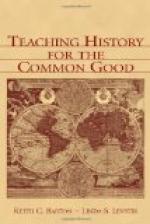1. Give three distinct
characteristics of French colonization in
America;
three of Spanish; three of English.
2. What things did the English colonies possess in common?
3. What were the
results to the colonies of the French and Indian
War?
4. To what extent
was the Revolution brought about by economic
causes?
5. What were the defects in the Articles of Confederation?
6. Account for the downfall of the Federalist party.
7. In what ways has democracy advanced since 1789?
8. What were the
results of the struggle over the admission of
Missouri?
9. Discuss the growth of the sentiment for internal improvements?
10. Describe the social life of the Western pioneer?
What the student may do with “problems” in history
Still another kind of review of great value in strengthening the student’s ability to generalize and analyze, consists of what might be called “problems in history.” They are given out in much the same way as original problems in geometry, assuming that the student is acquainted with the facts from which to deduce the answers to the question. The object of such a review is to give the student practice in original thinking. He is not supposed to use a library, but only the facts which are in his text or which have been previously brought out in class recitations.
The following are examples of questions adaptable for this purpose:—
1. Why can the
American people be regarded as the world’s greatest
colonizers?
2. Why could Washington
be regarded as only an Englishman living in
America?
3. Is it true that the South lost the Civil War because of slavery?
4. In what particulars
did Andrew Jackson accurately reflect the
spirit
or the ideals of the new West?
5. What is illustrated
by the attempt to found the State of
Franklin?
6. What considerations
made the secession of the West in our early
history
a likely possibility?
Questions of this kind, not answered directly in class or in the text, may be given out a day in advance and the answers collected at the next recitation.




